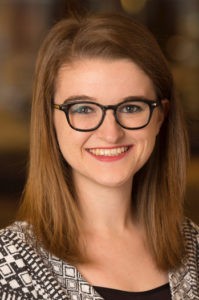As we rummaged through rooms of old books, I couldn’t help but mourn a bit. My dad, giving away his library. It felt like the end of an era.
My dad always seems at home when surrounded by books. I remember when we were in Cambridge bursting into the dimly lit room where he was writing in the small strip in the middle of a desk since the edges were occupied with stacks and stacks of books. Over the years, he’s always been the early riser in the house. And on the rare occasions that I was the second person awake, I often found him sitting on the couch accompanied by a book or two.
After she moved out, my sister’s bedroom morphed into a home office, but the shelves were not long enough to contain all my dad’s needed books. They spilled over in piles onto the bed and littered the floor in stacks.

Laura Ellis
This past Christmas, he took me to Logsdon Seminary at Hardin-Simmons University to look through his library. There were books in his office, in two large closets, in another office, and in a classroom. And again, there simply wasn’t enough shelf space. The books migrated to boxes, conference tables, the floor. Although many were my dad’s, not all the books were his. Some were left by other departing professors, and a few were my grandfather’s Greek books that my dad inherited when my grandfather retired, in the same way I was now inheriting my dad’s books.
It felt like my dad’s life’s work was gathered here in these rooms of books, as he gestured and told me to take what I wanted. But of course, that wasn’t right. His life’s work was out in the world, alive in alumni bodies working in churches, universities and social ministries.
A great cloud of witnesses
And for a moment I imagined all of Logsdon’s alumni packed into those crowded offices, classrooms and closets. Like the books, they wouldn’t fit on the shelves either. They wouldn’t even fit in the rooms. They’d overflow into Logsdon’s long curved hallways and leak into the seminar rooms and the chapel. They’d lean against the pews and stand below the window, admiring its beauty one last time. They’d be talking and laughing about all things religious and all things not. And because there would be more than two Baptists in the building, there’d be food, and plenty of it.
Maybe the food would be next to the books, and people nearest to it would pass plates and little purple napkins down the hallways until all were fed. Perhaps the food was in the books, in the lessons taught in the classrooms, in the songs sung in the chapel, in the lives lived in the hallways.
I never was a student at Logsdon Seminary, but this place made me who I am. I feel as though I grew up in the building. I remember when we were young, my sister and I would spend the day roaming the halls, watching a movie in one of the unoccupied classrooms, and writing little notes to each of the professors before slipping them into the faculty mailboxes.
“Growing up around Baptist theologians, my bedtime stories were built on the tumultuous tale we call Baptist history.”
But Logsdon’s influence on me was beyond its building. Growing up around Baptist theologians, my bedtime stories were built on the tumultuous tale we call Baptist history: its founding in dissent, those four freedoms, women in ministry, the eventual fundamentalist takeover of the Southern Baptist Convention, and attempts to rebuild. It was a dramatic legend, culminating around the takeover in the 1990s, which ousted churches and altered seminaries and was full of pain and exclusion. Yet that event became the inciting incident that created the Baptist world I grew up in — the one that taught me that my femaleness didn’t dictate my ability to minister, the one that promoted the priesthood of believers and the autonomy of the local church.
History lessons in college
In college, the further I wandered into the Baptist world, the more I discovered that these divides were something beyond mere legend. The debates my parents remembered all too well from the 1990s were still bubbling in conversations between myself and other students who also claimed to be Baptist.
“I still believed that the diverse Baptist world I was living in was big enough for everyone.”
In college, it seemed I could disagree with the theology of a fellow Baptist student, and neither of us would be ousted from the classroom or uninvited from the table. As heated as our conversations sometimes became, I still believed that the diverse Baptist world I was living in was big enough for everyone, where people across the aisle could commingle with a level of cordiality and occasional cooperation. It was a thing of myth.
I thought I was living in the aftermath of the takeover, but now I see that we were still trying to pick up the pieces from a conflict set in motion decades ago — a conflict that never really stopped, but only took a moment to rest. How easy it was to take for granted the assumption that the legend was nothing more than a story of the past. The last few years in the Baptist world has proved something else.
Lost joy in identifying as Baptist
When I started my master of divinity degree at Boston University School of Theology, I was proud to tell people I was Baptist. For the first time in my life, I wasn’t surrounded by other Baptists, yet I felt closer to my roots than ever before. No one I was around knew what it meant to be Baptist. So I found myself constantly explaining it to people and discovered I was proud of our dissenting origins and our stance on soul freedom, Bible freedom, church freedom and religious freedom.
These days, I rarely find joy in describing to people what it means to be Baptist because Baptists have become largely unrecognizable to me. As I look around at the shifts being made in the Baptist world today, I don’t see those freedoms anymore. It seems our heritage of Baptist freedom has changed to nothing more than hungry, greedy Baptist power, as many, especially in Texas, secretly backslide once again into fundamentalism.
“It seems our heritage of Baptist freedom has changed to nothing more than hungry, greedy Baptist power.”
I don’t know what the first takeover felt like, but from the childhood legends, it sounds dramatic and public. And yet this second takeover in Texas seems to have happened by the cloak of night. Decisions made by those with power from behind closed doors — perhaps that’s how takeovers always begin. Because of its subtle secrecy, some people naively believe this sudden shift is about eliminating a liberal agenda. But let’s not be fooled by scare tactics. And let’s not be blind to this new push for a fundamentalist agenda.
Some people recognize this takeover for what it is. They see the hierarchal control of the local church and seminaries. They recognize that this second takeover will again leave moderates without a place to be and women in ministry precariously close to being permanently unemployed by any Baptist church. I’m grateful for people who are returning to their dissenting origins on which Baptists were founded to fight for the tradition they love.
About the future
I’m not sure what the future of the Baptists will look like. As a woman, I’m skeptical that there will be a place here for me much longer.
My dad’s always been a more hopeful person than I have. In a way, his passing on of books was an act of hope — hope that something of what he helped build would continue. When I imagine all the Logsdon alumni pouring off the bookshelves and into the hallways and then out into the world, I see my dad’s hope realized.
If I ever have a daughter, I wonder if one day I’ll be able to tell her the legend of Baptist history like my parents told it to me. I wonder if the legend will end in the same loving hope that, if she wants to join the epic tale, her personhood as a female still will be welcomed in the Baptist timeline. I wonder if one day I might take her to my library at a Baptist institution and gesture to the books with hope, telling her to take whatever she wants. Or I wonder if the Baptists will continue to become so distorted and disfigured that neither of us will be welcomed in the Baptist timeline, its institutions or even at its table.
Laura Ellis is in her third year of the master of divinity degree at Boston University School of Theology, where she is a CBF leadership scholar. She is originally from Abilene, Texas, and is the daughter of Bob Ellis, dean of Logsdon Seminary.


